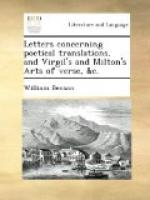1st, Their Words do not sound so fully as ours, of which these Nouns are Examples, God, Dieu. Man, L’Homme. In both the English Words every Letter is perceiv’d by the Ear. In the French the first Word is of a very confused Sound, and the latter dies away in the e mute. So Angels, Ange. Head, Tete. And innumerable others. And in Verbs, to love, to hate, Aimer, Hayir. In the English the Sound is clear and strong. In French the last Letter is dropp’d, and the Words don’t dwell upon the Ear like the English.
2d, They have too many Particles: To shew how much more their Verse is incumber’d by them than the English, I will give you an Example from a Passage in Milton.
“So spoke, so wish’d much
humbled Eve, but Fate
Subscrib’d not; Nature first gave
Signs, imprest
On Bird, Beast, Air; Air suddenly eclips’d
After short blush of Morn.—
Now to put this Passage into French all the following Particles must be added.
Le, La, Des, Les, Les, Le, Le, Un, Du. Of which there is not one in the English: And what an Effect this would have in Heroick Verse, you will easily judge.
Upon the whole, Vossius was very little acquainted with English Heroic Poetry. Hudibras was the favourite Bard in his time, and therefore he does us the Honour to say, the English is extremely fit for that sort of Poetry which the Italians call Sdruccioli, that is, Doggrel Verse.
Thus much for Vossius, and his French and English Poetry. I will now shew you a very different Opinion of another learned Foreigner, referr’d to more than once already, and I will give it you in his own Words.
“Sane in Epico Carminum genere;
Joh. Miltoni insigne poema, The
Paradise Lost, Gallos omnes in epicis
inseliciores longo post se
intervallo reliquit.
Morhosius
Polyhistor.




